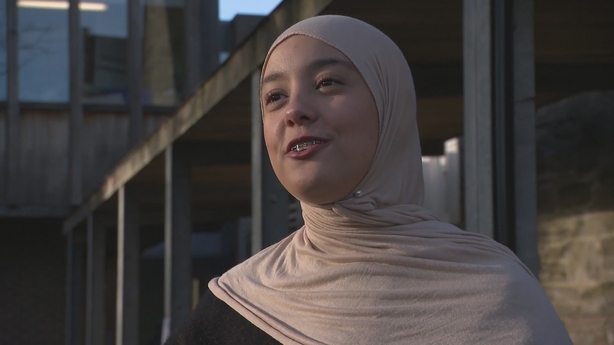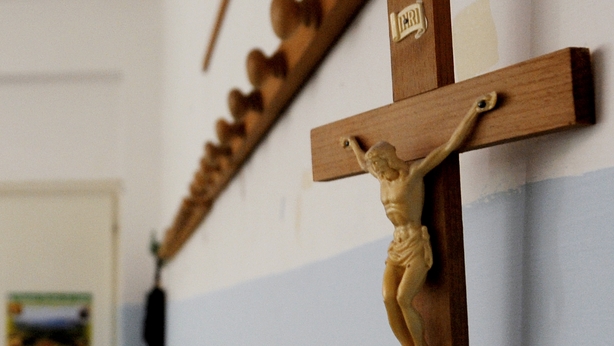In Senior Infants class at Model School Inchicore, trainee teacher Khadidja Ouidah is guiding pupils on a fantasy journey into a toymaker's workshop.
"When I put these glasses on who am I?" she asks them, holding aloft a pair of dark rimmed specs. "Tonica!" the children chant.
Tonica is the toymaker and the lesson is aimed at drawing out the children's imagination and creativity, also their ability to empathise - there will be a teddy bear left on a shelf who no one seems to want.
A trainee teacher in her third year at DCU, the sight of Khadidja, in her headscarf, teaching in an Irish classroom, is a highly unusual and perhaps even unique one.
The 19-year-old's four-week placement at the primary school that she herself attended as a child came to an end this week. It was the latest in a series of placements she has completed as part of her training.
Khadidja was apprehensive at first, but her experience, in both classrooms and staffrooms, has been entirely positive.
"I was a little bit scared going into schools, because obviously you don't see teachers who wear the hijab or anything, but it just shocked me, even the kids, they never commented anything about it. I am just another teacher coming in to teach them and that is so nice," she told RTÉ News.
"If anything, most of the kids they look at me and they say 'oh you have braces!'" (Khadidja wears orthodontic braces on her teeth.)
She also loves the positive impact her presence can have for Muslim children.
"It's so nice to have kids looking up to me and saying 'I want to be a teacher too, I didn't know you could be a teacher if you were Muslim'."
But this young trainee teacher faces an obstacle, one that rules out the prospect of her finding secure employment in almost 90% of primary schools here.
"When I graduate I won't have the Catholic Religious Education Certificate," Khadidja explained.

Almost nine out of ten of publicly funded primary schools here are Catholic. To be eligible for a fixed-term or permanent job in any of them a teacher needs to have completed the RE cert, which equips them to teach Catholic religious education and "to lead and live" the ethos of a Catholic school.
Most students of primary teaching here - whether or not they are Catholic - complete this optional module as part of their third level course.
They know that they need the Catholic RE cert in order to be able to work in most schools here. But Khadidja has chosen not to. As a Muslim she feels that she cannot teach Catholicism authentically.
"I could do it, but when a child asks me questions, I don't want to say something that is against my own religious beliefs. Like, how do I answer questions in a Catholic way? I'd be scared too that parents might not be happy. I'd just prefer if I didn't have to do it," she said.
Many working in primary education regard the Catholic cert requirement as an anachronism.
At their annual trade union congress last April, primary school teachers voted overwhelmingly for its removal.
Acknowledging "the need for more diversity in our teacher workforce to reflect our student population" delegates called on the leadership of the INTO "to engage with the relevant primary school patron and management bodies to remove the requirement for a religious certificate in order to teach in schools".
Catholic schools are the only ones that require teachers to have such a cert. No other religious school patron body does.
Both the Catholic Primary School Managers Association (CPSMA) and the Dublin Archdiocese defend the requirement. They say the certificate is simply a professional qualification. They stress that you do not need to be a Catholic to get it.
"It's a professional qualification in the same way that you need to be able to teach Irish," Seamus Mulconry of the CPSMA said.
"We don't require that you be a believer to teach religion."
"It is a professional qualification and we ask people to have it," Monsignor Dan O'Connor, Episcopal Vicar for Education at the Dublin Archdiocese told RTÉ News.
"There are cases of teachers who are not of the faith but who are graduates of a Catholic college and have the cert."
With 447 primary and 120 secondary schools, the Dublin Archdiocese is the country's largest school patron.
Earlier this year, Monsignor O'Connor wrote to primary schools in the archdiocese reminding them of the requirement.
"It is important to ensure that all the teachers have the Religious Education Certificate," he wrote.
This may have been a timely reminder because it seems not all schools in the archdiocese are adhering to the requirement.

A number of long-serving school principals spoke to RTÉ News for this article, all on condition of anonymity.
"I ignore it," the principal of one Catholic primary school in Dublin said.
"Children in schools need highly trained professional and compassionate teachers. If I'm employing someone with those qualities then as far as I'm concerned the RE cert is not an issue and certainly during this current staffing crisis, it shouldn't be an issue anywhere."
This principal's attitude towards the certificate is unequivocal, and it is one that is shared by other Dublin school principals who have spoken to RTÉ News.
"It's ridiculous. There are some fine young people who might love to go on and do teaching, but they're from another faith or none, and we're blocking them," she said.
It is the dioceses that sanction the hiring of teachers and principals. Catholic schools must submit a form to their diocese with a box that must be ticked to confirm that the proposed employee has the Religious Education certificate.
This principal said: "We just tick the box for teachers. We would be a bit more careful though with the box ticking for a principal or a deputy principal."
Monsignor O'Connor takes issue with this. "Whoever told you that they don't look for it are telling you a load of rubbish, they are spoofing," he said.
While some Catholic schools may be ignoring the requirement, others take it seriously.
The principal of a rural school with an ethnically diverse pupil population said: "It's a cultural thing, it's a tradition and it would be respected.
"I can envisage change and I am very open to change, and you do have to respect diversity. But when you are dealing with values, you have to tread carefully. Dropping it would be a step too far at the moment," they said.
The principal of a third school, in a midlands town and with a diverse pupil body, has a different view: "Should it be gotten rid of? 100%. This is 2024."
This principal may not agree with the requirement, but he does enforce it. During interviews for teaching jobs, he said the applicant is always asked if they have the RE certificate and whether they would be prepared to teach communion and confirmation classes.
"You have teachers whose answers are so over the top. They are nearly joining the nuns, talking about the holy spirit and the body of Christ," he said.
They behave like this because they feel that the offer of a job could hinge on how convincing their Catholicism is.
This principal describes one interview where the applicant told the panel she did not have the certificate but was "working towards it".
"I nearly fell off my chair. That was her utterly gone. We could have terminated the interview there and then. That's how strict it is."
Monsignor O'Connor disagrees that the RE certificate is a barrier to diversity in the teaching profession.
"We have very good teachers who are cradle Catholics but who don't practice any more. If a person comes along and says 'I have a crisis of faith, please don't ask me to teach communion or confirmation,' arrangements are made. We have done that several times."
He insists that not being Catholic is not in itself a barrier to teaching in a Catholic school.
"In the archdiocese there are cases of people who are not of the faith," he said, and later he contacted RTÉ News with data to support this.
"There are three teachers working in primary schools in the archdiocese who are not of the faith, but who have the RE certificate," he said. His advice to any teacher in Khadidja's position is to "get the certificate".
In practice, this is what the vast majority of students training to be teachers do. They know not having it will strongly hamper their career prospects.
It is not just the INTO that is calling for diversity in teaching. A more diverse teacher workforce is a strategic priority for the profession's regulatory authority, the Teaching Council.
It has commissioned research to measure the profile of the current teaching population.
The Department of Education does not gather any data on teacher ethnicity, but Higher Education Authority figures show that of all fields of study, education is the least ethnically diverse. 95.5% of students enrolled on third level education courses identify as 'white Irish,' compared to an average of 75% across third level fields of study generally.
"We need to have an honest conversation about this," says Dr Rory McDaid, a college lecturer and co-editor of 'Diversifying the Teaching Profession Dimensions, Dilemmas and Directions for the Future', "about the impact it has on the almost one in three of the Irish population who report their religion as other than Roman Catholic, and that includes the 14% and rising who say they have no religion".
Dr McDaid says: "Given the origin of the gesture, it strikes me as ironic that in order to work in over 88% of publicly funded primary schools here, many prospective teachers are metaphorically crossing their fingers while seeking to convince a recruitment panel of their suitability to nurture the faith of Catholic children and their commitment to support sacramental preparation".

The principal of the Model School, Breda McEvoy, says the diversity common in Irish classrooms needs to be reflected in the teaching population.
"I think that as a society we need to be open and welcoming of everybody. As a Catholic school we don't ask parents to tell us their religion. If one of my past pupils applied for a job I would be delighted. I do feel that it's important for the children to have people like them teaching them."
But for now, for at least one past pupil, that is not possible.
Khadidja would love to be able to work in her old school, or one just like it, but the RE cert requirement, and her sense of what is right, is standing in the way.
Back in Senior Infants at the Model School, Khadidja is Tonica now, the toymaker, and the children are in a different world. Sitting cross-legged on the floor around her chair, they are engrossed, hanging on the toymaker’s every word.
Khadidja has another year and a half to go before she qualifies. She is excited about becoming a teacher.
"If I do get an offer of a job, I'm more than happy to work in Ireland," she says.
But she thinks that she may have no choice but to move abroad.







